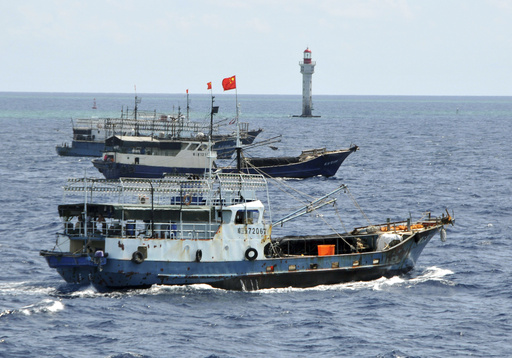SEOUL, South Korea — A recent report reveals that a number of Chinese distant-water fishing boats employed North Korean crews between 2019 and 2024, breaching U.N. prohibitions. Furthermore, many of these workers allegedly faced severe hardships, including being stranded at sea for extended periods, as stated in a Monday publication.
The findings by the Environmental Justice Foundation (EJF), a London-based organization dedicated to environmental and human rights advocacy, highlight the involvement of North Koreans on twelve Chinese tuna long-liners operating in the southwest Indian Ocean. This report primarily relies on testimonies gathered from 19 Indonesian and Filipino crew members who had worked alongside the North Korean personnel.
According to the report, “The accounts from Indonesian and Filipino sailors indicate that systematic efforts were in place to conceal the presence of North Koreans on these fishing vessels, with reports of some individuals forced to remain at sea for as long as ten years without ever reaching land.” This scenario constitutes a form of forced labor that exceeds many abuses typically acknowledged within the global fishing sector, the report asserts.
EJF detailed that North Korean laborers were frequently transferred between vessels through a practice known as “trans-shipment,” effectively preventing their return to shore. Testimonies from unnamed Asian crew members suggested that their North Korean counterparts were prohibited from utilizing mobile phones or disembarking during port visits.
While EJF couldn’t provide an exact figure for the number of North Koreans working on the Chinese fishing vessels, they noted that those workers were consistently moved to sister ships. The employment of North Korean personnel contravenes a U.N. Security Council resolution established in 2017, which prohibits member countries from issuing work permits to North Koreans and mandates the repatriation of existing North Korean laborers by the close of 2019. This resolution was implemented following North Korea’s long-range missile tests that violated U.N. directives.
EJF also pointed out that the practices involving North Korean workers seem to circumvent legal regulations within the United States and the European Union aimed at preventing products crafted by North Koreans from entering their markets. Alongside Russia, China is suspected of inadequately enforcing U.N. sanctions against North Korea and has consistently vetoed U.S. initiatives to strengthen punitive measures against the nation amid its prohibited weapons tests.
The Chinese Foreign Ministry has not yet issued a response regarding these findings. Prior to the U.N. deadline in 2019, it was estimated that tens of thousands of North Koreans were employed abroad, primarily in factories and restaurants in China, as well as in logging operations and construction projects in Russia, to generate essential foreign revenue. The EJF claims this is the first documented instance of North Korean labor being observed on distant-water fishing vessels.
Defectors and experts have noted that North Korean workers abroad are typically monitored by agents of their government, endure working hours exceeding 12 hours per day, and take home only a small portion of their wages, with the majority funneled back to their government. Despite U.N. restrictions, South Korean officials and analysts maintain that a significant number of North Korean workers continue to be engaged in global economic activities, funneling funds that may be allocated towards the nation’s nuclear armament initiatives.


